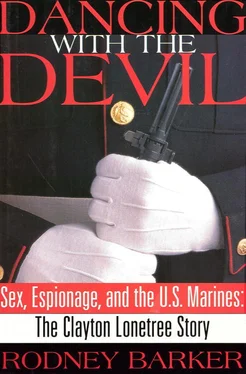Even before a formal assessment of the damage had begun, government officials were expressing outrage and hinting at irreparable damage to the security of the Western world. Within the CIA there was conjecture that perhaps this accounted for the decimation of Moscow station. For several years the CIA had been experiencing significant losses in Moscow for which it had no explanation. A number of technical means of collecting intelligence information had gone bad. Equipment had been shut off or located and destroyed. As well, human assets that had been carefully cultivated for years inside the Soviet Union had been arrested and executed. Some of this had been attributed to Edward Lee Howard but not all, and the Agency had been at a loss and willing to consider any explanation, even that one of their own agents might be a traitor. But if the Russians had been given a chance to snoop, bug, and pore over CIA files identifying agents and informers in the Soviet Union, that explained everything.
The Reagan administration was forced to deal with the notion that for several years it had been playing poker with someone who’d had the benefit of looking at a mirror over the shoulders of their negotiators during discussions about arms control and space-based weapons systems. It was speculated that this might explain what happened at the summit at Reykjavik, Iceland, in October of the previous year, when administration officials had been disturbed by the Soviets’ uncannily well-prepared responses to U.S. positions. Perhaps they’d had inside information derived from wiretaps on the communications gear.
In the days that followed, the Marine Spy Scandal dominated the headlines of every newspaper and periodical in the country, its seriousness ratcheted up by a succession of revelatory detonations. It was written that FBI counterintelligence experts had long ago warned the State Department about chinks in its security structure that enabled the Soviets to enjoy espionage opportunities, but diplomats had been more concerned about good foreign relations than the espionage threat and no action had followed the recommendations. Investigative articles about how Marines in Moscow routinely violated the “no women in rooms” rule, frequented off-limits bars, falsified logbooks, disregarded regulations, and took advantage of the lack of supervision were quickly followed by the announcement that so many more Marines had admitted to security violations with espionage implications that the entire twenty-eight-member Marine detachment in Moscow was being recalled to Quantico, which led to rumors of a Marine “spy ring.” With the temperature dropping in superpower relations, Reagan administration officials acknowledged that security in the embassy may have been so compromised that Secretary of State Shultz, who was scheduled to make a trip to Moscow to discuss intermediate-range nuclear forces, might not be able to hold safe conversations or file confidential reports to Washington from the embassy without the Soviets’ tuning in, so a special van, referred to as the “Winnebago,” would be flown over for security purposes.
Just as newspapers loved a scandal because it increased sales, politicians welcomed one because it provided a great vehicle for partisan posturing, and congressmen on both sides of the aisle jumped into the fray. All but sputtering with fury, Senate Majority Leader Robert Byrd (D-W.Va.) delivered a speech on the Senate floor in which he gave the White House a severe dressing down. “While this Administration talks tough about combatting communism, about pouring our efforts into supporting freedom fighters wherever they may be found, American security is being compromised from the docks of Norfolk to the inner sanctums of our embassy in Moscow.” No sooner had he taken his seat than two members of the House Foreign Affairs subcommittee, Rep. Daniel Mica (D-Fla.) and Olympia Snowe (R-Me.) leapt to their feet to declare their intention to fly to Moscow for a firsthand inspection of the embassy. Many people dismissed the congressional junket as political grandstanding, especially when Mica, at a press conference just prior to their departure, held aloft a red child’s slate on which words could be written and then erased by lifting a sheet of cellophane, and complained, “After millions of dollars have been spent to make our embassies secure, we have been told that this will be the only safe method of communicating while we are in Moscow.” But when Mica and Snowe released a report on their findings and asserted that not only had the American embassy been penetrated, but the new U.S. embassy building under construction in Moscow was honeycombed with electronic listening devices planted by Soviet builders and should be demolished, official Washington went into an anti-Communist frenzy not seen since the McCarthy era.
• • •
As director of counterintelligence, Lanny McCullah was kept informed of ongoing cases by his various department heads, and if there was a problem developing, he would sometimes ask to be kept advised, or if something appeared to be going astray or breaking big, he would sometimes stick his oar in. When Special Agent Mike Embry called headquarters from Twentynine Palms and reported that after failing a series of polygraph examinations Cpl. Arnold Bracy had copped out under intense interrogation and admitted that he and Sergeant Lonetree opened the doors and let Soviet agents into the embassy, McCullah had taken immediate acion. The first call had been to the CIA, and the second to the State Department, and by ten o’clock that night a man from each institution knowledgeable about the security systems in the embassy had joined a senior NIS agent on a red-eye flight out of Dulles bound for California. Their assignment was to evaluate the confession, formulate questions, and take the whole interrogation to a higher level—but they never got that chance. They were still in the air when Embry called back to say Arnold Bracy had terminated the interrogation and asked for a lawyer. So the embassy experts made a U-turn, flying back to Washington the next day with the original copy of Bracy’s statements.
It had been a Saturday, but McCullah had come into the office anyway, where he was met by Jim Lannon and Gardner “Gus” Hathaway—the counterintelligence chiefs of the State Department and CIA respectively. Bracy had given NIS agents three sworn statements, and the three CI chiefs read them slowly and carefully, paying as much attention to the minutiae as to the major revelations.
In the first statement, Bracy had acknowledged knowing both Sergeant Lonetree and Galya Gallotina, but claimed he had not been good friends with the former, and that was all he’d been with the latter. Given a polygraph examination in which he’d been asked such questions as “Did you engage in any sexual activity with Galya?” and “Have you ever engaged in espionage against the United States?,” when Bracy responded “No,” deception had been indicated.
In his second statement, he revised his story, admitting that he had had intercourse with Galya and that she told him the KGB had been putting pressure on her to arrange for him to meet “Uncle Sasha,” who was interested in learning the names of CIA agents. After failing a second series of polygraphs in which he was asked “Did you ever have a personal meeting with Galya’s Uncle Sasha?” and “Did you ever give any classified information to a Russian?,” Arnold Bracy appeared to at last be willing to tell the whole truth. He said that on several occasions when he and Sergeant Lonetree stood night duty together, he had shut down the alarm systems while Lonetree escorted Soviet agents around the embassy. “I could tell where he was by the alarms that went off,” Bracy’s statement read. “I know that he was everywhere, including the CPU on two or three occasions, and also into CIA spaces… and each time they were there for about an hour.” The statement was signed, but that was the last cooperative act on the part of Arnold Bracy. Moments after reviewing his statement, signing each page, and swearing to its accuracy, he recanted and invoked his right not to be compelled to testify against himself. According to the polygraphers, he said, “I’d rather go to prison for false swearing than espionage.”
Читать дальше












